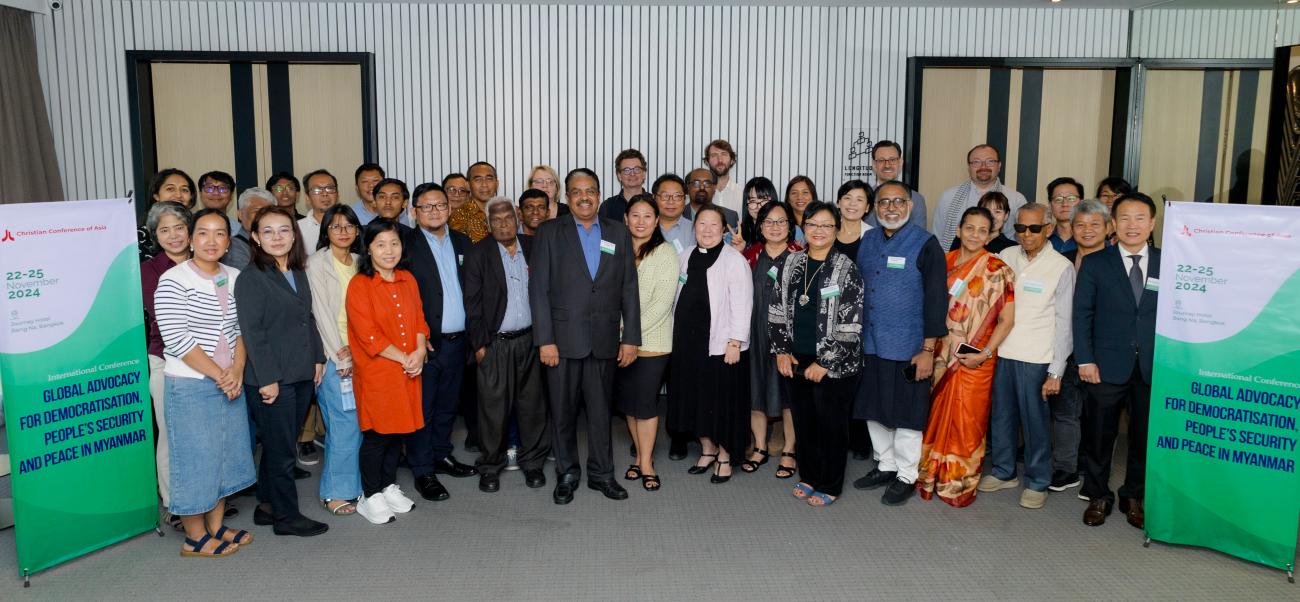International conference calls for global action to address worsening humanitarian crisis and the prospects for peace with justice in Myanmar

Bangkok, Thailand: An international conference organised by the Christian Conference of Asia (CCA) on ‘Towards a Global Advocacy for Democratisation, People’s Security, and Peace with Justice in Myanmar’ called for global action to address Myanmar’s worsening humanitarian crisis and the prospects for peace with justice.
The conference, held in Bangna, Bangkok, Thailand, from 22 to 25 November 2024, was attended by sixty participants from across Asia, North America, and Europe, including representatives of Myanmar’s diaspora in various countries. Participants included representatives of faith-based organisations, ecumenical partner organisations and churches, civil society organisations, ethnic regional groups, as well as social and human rights organisations, peace activists, and journalists, among others.
The four-day consultation addressed important issues related to Myanmar’s ongoing crisis situations and explored options for the international community to engage in global advocacy for peace and reconciliation in Myanmar.
The topics discussed included: ‘Legacy and the Conundrum of the Conflicts in Myanmar: Role of the Military, External Influences, and Geopolitics’; ‘People’s Security in Myanmar: Challenges Within and Beyond Borders’; ‘Challenges to Peace in Myanmar: Border Criminal Activities, Armed Conflict Stalemate, and Widespread Violence’; ‘Ethnic Diversity, Ethnic Strife, and the Future of a Democratic and Federal Myanmar’; ‘Myanmar’s Civil War: Foreign Policy in Relation to Russia, China, and ASEAN’; ‘Peacebuilding in Myanmar: Role of Civil Society and Faith-Based Organisations’; ‘Human Dignity and Human Rights in Myanmar: Reflections from Inter-Religious Perspectives’; ‘Towards Policy Solutions for a Peaceful and Democratic Myanmar: Alternative Prospective Pathways’; ‘Role of Ethnic Communities in Ensuring Peacebuilding’; and ‘Roles of the International Community and Multilateral Organisations in Peacebuilding in Myanmar’.
The conference adopted the proposal to initiate a special programme of ecumenical accompaniment and solidarity for Myanmar.
A communiqué, adopted towards the end of the conference and titled ‘Bangna Communiqué on the Political, Economic, and Humanitarian Crisis and Prospects for Peace with Justice in Myanmar’, outlined the grave consequences of Myanmar’s ongoing political, economic, and humanitarian crisis, which has intensified since the February 2021 military coup.
The communiqué reflected the discussions at the conference, emphasising the urgency of international solidarity and calling for a renewed commitment to justice, inclusion, and sustainable peace, ensuring that the voices of Myanmar’s people are heard and their suffering is not forgotten.
It urged national governments, ASEAN, the United Nations, and other international actors to take decisive and coordinated action to address the escalating crisis, restore peace, and uphold justice.
Key appeals made in the communiqué included upholding international humanitarian law, protecting civilian lives and property, providing unrestricted humanitarian support, and ensuring aid delivery to affected populations. It also called for genuine, inclusive dialogue with all ethnic groups and stakeholders to foster unity and resolve long-standing conflicts in Myanmar.
Accountability and reforms were highlighted as critical steps, including rebuilding democratic institutions and holding the military regime accountable for its actions. The communiqué stressed the importance of supporting displaced communities by providing vital resources such as shelter, healthcare, and education for refugees and internally displaced persons.
The communiqué also expressed concern over ASEAN’s ineffective implementation of its Five-Point Consensus and urged member states to adopt a more robust and inclusive approach. It called on United Nations and humanitarian agencies to ensure adherence to international law, protect civilians, and convene an international summit on Myanmar.
Faith-based organisations were urged to foster intercommunal harmony, engage in peacebuilding, provide pastoral care and critical humanitarian support, while international actors were encouraged to support bottom-up governance efforts, empower local communities, and ensure the return of legitimate civilian rule.










